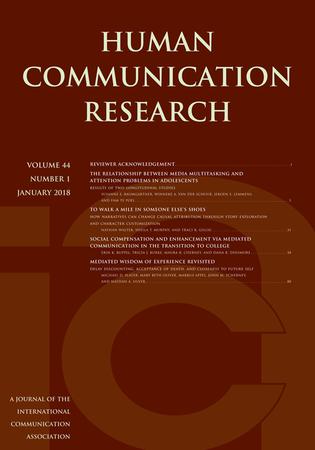Challenges to correcting pluralistic ignorance: false consensus effects, competing information environments, and anticipated social conflict
IF 3.3
1区 文学
Q1 COMMUNICATION
引用次数: 0
Abstract
For many policy issues, people holding the majority opinion often do not act in accordance with their beliefs. While underestimating public opinion appears as a likely cause, correcting this misperception often fails to motivate those in the majority to act. Investigating further, we surveyed a nationally representative sample (N = 1,000) of Republican voters about vaccination. Despite a majority supporting vaccines, Republicans on average underestimated other Republicans’ support. However, this misperception occurred primarily among anti-vaccine Republicans—a group that reported a greater willingness to share their vaccine views. We show how an information environment overrepresented with minority views may discourage majority view holders from speaking out even when they are aware of their majority status. That is, instead of experiencing pluralistic ignorance, those in the majority may be discouraged from expressing their views due to anticipated social conflict from engaging in an information environment disproportionately made up of minority views.纠正多元化无知所面临的挑战:虚假共识效应、竞争信息环境和预期的社会冲突
在许多政策问题上,持多数意见的人往往不会按照自己的信念行事。虽然低估民意似乎是一个可能的原因,但纠正这种错误认识往往无法促使多数人采取行动。为了进一步调查,我们对具有全国代表性的共和党选民(N = 1,000)进行了有关疫苗接种的抽样调查。尽管大多数人支持疫苗接种,但共和党人平均低估了其他共和党人的支持率。然而,这种误解主要发生在反疫苗的共和党人中--他们更愿意分享自己对疫苗的看法。我们展示了一个少数派观点过多的信息环境是如何阻碍多数派观点持有者发表意见的,即使他们知道自己是多数派。也就是说,多数人可能不会经历多元化的无知,反而会因为预期的社会冲突而不愿表达自己的观点,因为他们所处的信息环境过多地包含了少数人的观点。
本文章由计算机程序翻译,如有差异,请以英文原文为准。
求助全文
约1分钟内获得全文
求助全文
来源期刊

Human Communication Research
COMMUNICATION-
CiteScore
8.20
自引率
2.00%
发文量
28
期刊介绍:
Human Communication Research is one of the official journals of the prestigious International Communication Association and concentrates on presenting the best empirical work in the area of human communication. It is a top-ranked communication studies journal and one of the top ten journals in the field of human communication. Major topic areas for the journal include language and social interaction, nonverbal communication, interpersonal communication, organizational communication and new technologies, mass communication, health communication, intercultural communication, and developmental issues in communication.
 求助内容:
求助内容: 应助结果提醒方式:
应助结果提醒方式:


